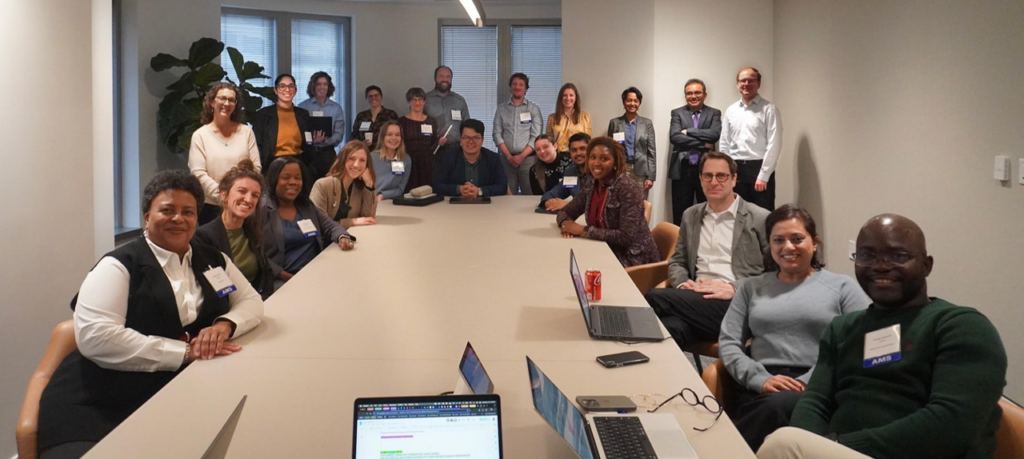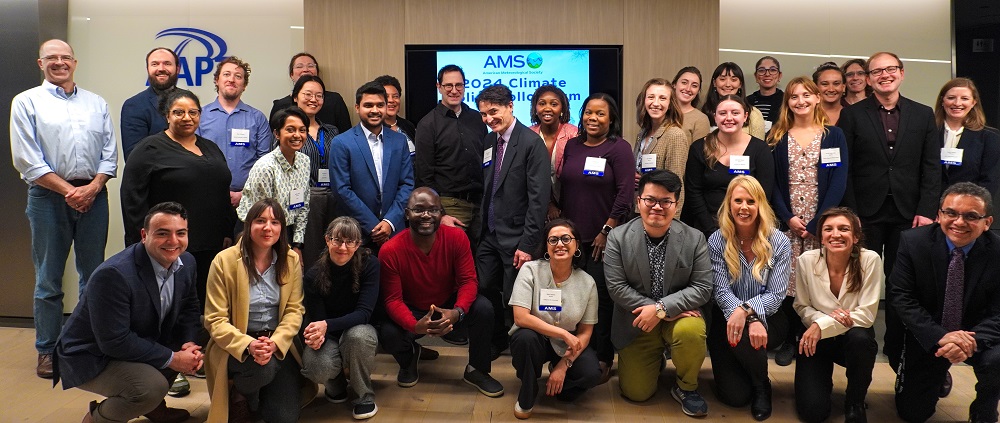By Dr. Michael Akinwumi, Chief AI Officer, National Fair Housing Alliance and 2024 Rita Allen Civic Science Fellow, Eagleton Institute of Politics, Rutgers University
Note: This is a guest blog post; it represents the views of the author alone and not the American Meteorological Society or the AMS Policy Program. The AMS Policy Colloquia are non-partisan and non-prescriptive, and promote understanding of the U.S. federal policy process, not any particular viewpoint(s).
It’s not every day that a scientist or engineer finds themselves negotiating amendments to a bill in a mock Senate committee markup. Yet there I was — role-playing a U.S. Senator — debating, bargaining, and defending amendments in the name of my constituents.1 My participation in the 2024 Climate Policy Colloquium was more than just a dive into legislative mechanics; it was a front-row seat to how policy is made, influenced, and transformed through interdisciplinary collaboration.
Science, Policy, and the Power of Influence
Coming from a STEM background, I had always viewed policy as an abstract force that shaped society. But experiencing the policy-making process firsthand changed my perspective. I walked away with a new appreciation for the intricate mix of negotiation, strategic compromise, and power dynamics that make legislation possible.
For one week, I lived the life of a policymaker — participating in discussions about federal budgeting, the role of congressional staff, and the legislative process. I learned that policy isn’t just about data and logic; it’s about influence, coalition-building, and understanding the human factors that drive decision-making.
Take, for example, our mock legislative exercise on the Energy Innovation and Carbon Dividend Act of 2023 (H.R. 5744). Working with my dedicated team as a U.S. Senator, we crafted first- and second-degree amendments that required balancing the interests of our assigned state (West Virginia) with broader policy goals.
As our team navigated the committee markup process, I found myself drawing unexpected parallels between climate policy negotiations and the current discourse surrounding AI infrastructure development. Just as West Virginia grapples with transitioning from traditional energy sources while protecting local interests, communities today face similar challenges with the rapid expansion of AI infrastructure — particularly with projects like Stargate and the proliferation of data centers.2
This experience underscored a critical lesson: science and engineering expertise are invaluable in shaping effective policy, but technical knowledge alone won’t move legislation. It takes communication skills and interdisciplinary collaboration.

AI Infrastructure, Housing, and the Environment
I couldn’t help but connect these policy lessons to one of today’s most pressing issues: the intersection of AI infrastructure, housing affordability, and environmental justice. AI-driven economic shifts are reshaping real estate markets, and increasing housing opportunity costs.
Massive investments in AI infrastructure — particularly data centers — are leading to skyrocketing electricity demand, land acquisition for server farms, and water usage concerns. This has direct implications for housing and the environment. In cities where these data centers are being developed, the influx of high-tech investments could exacerbate existing crises unless our elected representatives rally behind legislative efforts addressing displacement and environmental impact.
We need policies that effectively balance technological advancement with equity and sustainability. This requires voices from both the STEM and policy communities.
Why Interdisciplinary Training Matters
The biggest takeaway from my experience at the Climate Policy Colloquium is that interdisciplinary training is essential for scientists, engineers, and policymakers alike. Scientists and engineers must understand the policy-making process to effectively advocate for evidence-based policies. At the same time, policymakers need a foundational understanding of science and engineering to craft legislation that is both technically sound and socially equitable.
Institutions like the AMS Climate Policy Colloquium provide a crucial bridge, equipping STEM professionals with the tools to engage in policy and governance. If we want to build an AI-powered future that is just, sustainable, and equitable, we need more STEM professionals stepping into policy spaces — and more policymakers willing to collaborate with scientists and engineers.
Board the Flight
If you are a scientist or engineer curious about policy-making, or a policymaker eager to better understand the technical dimensions of emerging challenges, I encourage you to seek out interdisciplinary training opportunities. Attend policy workshops, engage with legislators, and contribute your expertise to policy discussions.
For my fellow scientists considering involvement in policy: the path from quantitative analysis to legislative negotiation may seem daunting, but it’s essential. Policymaking isn’t just for career politicians. It’s for anyone who wants to shape the future — and that includes us, the scientists and engineers.
Many thanks to the Eagleton Institute of Politics, Rita Allen Foundation, and National Fair Housing Alliance for supporting my participation in the training. I also want to acknowledge the amazing colleagues that worked with me as congressional staff during the colloquium.
1 During the in-person week of the AMS Policy Colloquia, participants conduct a mock Senate committee markup and vote on the Energy Innovation and Carbon Dividend Act of 2023 (H.R. 5744). The goal of this legislative exercise is to put attendees in the shoes of a U.S. senator to gain first hand experience with the integration of politics, policy, and procedure.
2 OpenAI, “Announcing the Stargate Project,” OpenAI Blog, January 21, 2025.
Photo at top: Alumni of the first ever AMS Climate Policy Colloquium. Photo: Isabella Herrera, AMS staff.
About the AMS Science Policy Colloquium
The AMS Climate Policy Colloquium is an intensive and non-partisan introduction to the United States federal policy process for scientists and practitioners; participants meet with congressional staff, officials from the executive office, and leaders from executive branch agencies. Attendees gain insight into the United States policy-making process and the climate policy landscape, explore emerging challenges and opportunities in climate science and policy, and examine the inner workings of government agencies working at the interface of science and policy.
